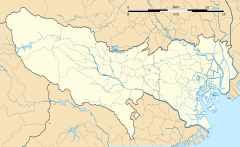Haijima Station
 From Wikipedia the free encyclopedia
From Wikipedia the free encyclopedia
JC55 SS36 Haijima Station 拝島駅 | |||||||||||||||||||||||||||||||||||||||||||||||||||||
|---|---|---|---|---|---|---|---|---|---|---|---|---|---|---|---|---|---|---|---|---|---|---|---|---|---|---|---|---|---|---|---|---|---|---|---|---|---|---|---|---|---|---|---|---|---|---|---|---|---|---|---|---|---|
 South side of the station in April 2021 | |||||||||||||||||||||||||||||||||||||||||||||||||||||
| General information | |||||||||||||||||||||||||||||||||||||||||||||||||||||
| Location | 4 Matsubara-chō (JR East) 5-21-2 Mihori-chō (Seibu) Akishima, Tokyo (東京都昭島市松原町4丁目 (JR East) 東京都昭島市美堀町5-21-2 (Seibu)) Japan | ||||||||||||||||||||||||||||||||||||||||||||||||||||
| Coordinates | 35°43′16″N 139°20′37″E / 35.721217°N 139.343542°E | ||||||||||||||||||||||||||||||||||||||||||||||||||||
| Operated by | |||||||||||||||||||||||||||||||||||||||||||||||||||||
| Line(s) | |||||||||||||||||||||||||||||||||||||||||||||||||||||
| Distance | 6.9 km from Tachikawa | ||||||||||||||||||||||||||||||||||||||||||||||||||||
| Platforms | 1 side platform + 3 island platforms | ||||||||||||||||||||||||||||||||||||||||||||||||||||
| Other information | |||||||||||||||||||||||||||||||||||||||||||||||||||||
| Status | staffed ("Midori no Madoguchi") | ||||||||||||||||||||||||||||||||||||||||||||||||||||
| Station code | JC 55 (JR East) SS 36 (Seibu) | ||||||||||||||||||||||||||||||||||||||||||||||||||||
| History | |||||||||||||||||||||||||||||||||||||||||||||||||||||
| Opened | 19 November 1894 | ||||||||||||||||||||||||||||||||||||||||||||||||||||
| Passengers | |||||||||||||||||||||||||||||||||||||||||||||||||||||
| FY2019 | 29,946 (JR East) 36,317 (Seibu) | ||||||||||||||||||||||||||||||||||||||||||||||||||||
| Services | |||||||||||||||||||||||||||||||||||||||||||||||||||||
| |||||||||||||||||||||||||||||||||||||||||||||||||||||
| |||||||||||||||||||||||||||||||||||||||||||||||||||||
Haijima Station (拝島駅, Haijima-eki) is an interchange passenger railway station located in the city of Akishima, Tokyo, Japan, jointly operated by East Japan Railway Company (JR East) and the private railway operator Seibu Railway. The station is also a freight depot for the Japan Freight Railway Company (JR Freight).
Lines
[edit]Haijima is a major stop on the Ōme Line between Ōme and Tachikawa, with through services operating to and from Tokyo via the Chūō Line (Rapid). Haijima is a station stop for the Ōme limited express service. It is 6.9 kilometers from the start of the Ōme Line at Tachikawa.
Nominally a terminus of the Itsukaichi Line, Haijima has many through trains going from Tachikawa to Musashi-Itsukaichi.
Trains on the Hachikō Line connect Haijima to Hachiōji and Komagawa, with through services to and from Kawagoe on the Kawagoe Line. It is 9.9 kilometers from Hachiōji Station.
Haijima is a terminus of the Seibu Haijima Line, with services running from Seibu Shinjuku via the Seibu Shinjuku Line. It is 14.3 kilometers from the opposing terminus of the line at Kodaira and 36.9 kilometers from Seibu Shinjuku Station.
The station also has an industrial line to Yokota Air Base for supplying fuels to the base.[1]
Station layout
[edit]
The JR East side of the station consists of one side platform and two island platforms serving a total of five tracks.[2] The station building is elevated and is above the tracks and platforms. the station has a "Midori no Madoguchi" staffed ticket office.
The Seibu side of the station consists of one island platform serving two tracks.[3]
Platforms
[edit]| 1 | JC Itsukaichi Line | for Musashi-Itsukaichi |
| 2 | JC Ōme Line | for Ōme and Okutama |
| 3 | JC Ōme Line | for Tachikawa, Shinjuku, and Tokyo |
| 4 | ■ Hachikō Line | for Komagawa and Kawagoe |
| 5 | ■ Hachikō Line | for Hachiōji |
| 6/7 | for Kodaira and Seibu-Shinjuku |

Low-cost platform edge doors consisting of three bars that are raised and lowered were installed along part of platform 5 on an experimental basis in March 2015.[4]
History
[edit]The station opened on 19 November 1894.[2] The Seibu station opened on 15 May 1968.[5]
The southern section of the Hachikō Line between Hachiōji and Komagawa was electrified on 16 March 1996, with through services commencing between Hachiōji and Kawagoe.
Station numbering was introduced on all Seibu Railway lines during fiscal 2012, with Haijima Station becoming "SS36".[6]
Passenger statistics
[edit]In fiscal 2019, the JR portion the station was used by an average of 29,946 passengers daily (boarding passengers only).[7] In the same fiscal year, the station was the 26th busiest on the Seibu network with an average of 36,317 passengers daily.[8]
The passenger figures in previous years are as shown below. Note that the JR East figures only consider boarding passengers whereas the Seibu figures consider both entering and exiting passengers.
| Fiscal year | Daily average (JR) | Daily average (Seibu) | |
|---|---|---|---|
| 2005 | 26,225 | 14,118 | [9] |
| 2010 | 28,350 | 16,556 | [10] |
| 2015 | 29,880 | 17,668 | [11] |
Surrounding area
[edit]- Haijima Daishi Temple
References
[edit]- ^ "(U) CV-22 BEDDOWN AT YOKOTA AIR BASE" (PDF). Japan Ministry of Defense. 14 February 2015.
Another rail, the Seibu Haijima line, delivers fuel to the south end of the base.
- ^ a b "Haijima Station Information" (in Japanese). East Japan Railway Company. Retrieved 26 December 2010.
- ^ "Haijima Station Information" (in Japanese). Seibu Railway. Archived from the original on 12 June 2011. Retrieved 26 December 2010.
- ^ 八高線拝島駅で昇降式ホーム柵の使用開始 [Platform edge fences brought into use at Haijima Station on Hachiko Line]. Japan Railfan Magazine Online (in Japanese). Japan: Koyusha Co., Ltd. 2015. Retrieved 30 March 2015.
- ^ Terada, Hirokazu (July 2002). データブック日本の私鉄 [Databook: Japan's Private Railways]. Japan: Neko Publishing. ISBN 4-87366-874-3.
- ^ 西武線全駅で駅ナンバリングを導入します [Station numbering to be introduced at all Seibu stations] (PDF). News Release (in Japanese). Japan: Seibu Railway. 23 February 2012. Archived from the original (PDF) on 24 September 2015. Retrieved 22 August 2014.
- ^ 各駅の乗車人員 (2020年度) [Station passenger figures (Fiscal 2020)] (in Japanese). Japan: East Japan Railway Company. Retrieved 29 January 2021.
- ^ 各駅の乗車人員 (2020年度) [Station passenger figures (Fiscal 2020)] (PDF) (in Japanese). Japan: Seibu Railway Company. Retrieved 29 January 2021.
- ^ 東京都統計年鑑 平成17年 9 運輸及び通信 [Tokyo Metropolitan Government statistics (fiscal 2005)] (in Japanese). Japan: Tokyo Metropolitan Government. Retrieved 26 March 2021.
- ^ 東京都統計年鑑 平成22年 [Tokyo Metropolitan Government statistics (fiscal 2010)] (in Japanese). Japan: Tokyo Metropolitan Government. Retrieved 26 March 2021.
- ^ 東京都統計年鑑 平成27年 9 運輸及び通信 [Tokyo Metropolitan Government statistics (fiscal 2010)] (in Japanese). Japan: Tokyo Metropolitan Government. Retrieved 26 March 2021.[permanent dead link]

External links
[edit]![]() Media related to Haijima Station at Wikimedia Commons
Media related to Haijima Station at Wikimedia Commons
- JR East station information (in Japanese)
- Seibu station information (in Japanese)

